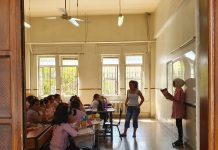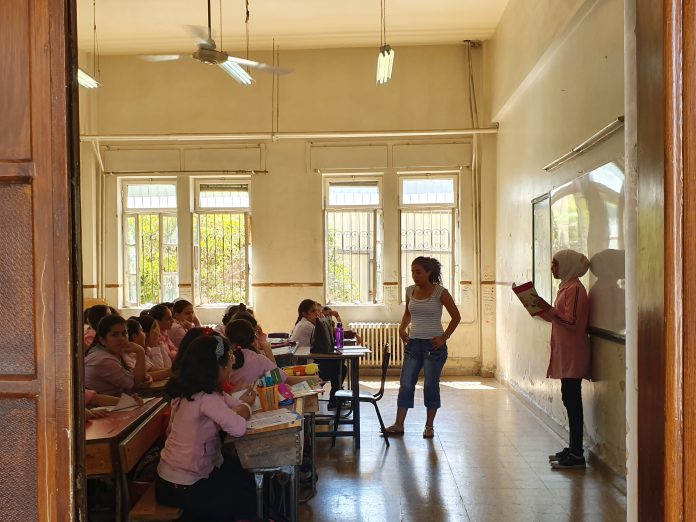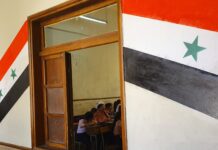Below is an extract only. For the full statement, please go to the press release from the Office of the High Commissioner, United Nations Human Rights, 10 Nov 2022:
UN expert calls for lifting of long-lasting unilateral sanctions ‘suffocating’ Syrian people
Preliminary findings of the visit to the Syrian Arab Republic by the Special Rapporteur on the negative impact of unilateral coercive measures on the enjoyment of human rights Prof. Dr. Alena Douhan, Damascus, 10 November 2022
Impact on Economy
From 2000 to 2010, Syria’s economic growth averaged more than 5% per year. The subsequent conflict had catastrophic effects on the economy, with significant damage and destruction of its productive capacity, assets and infrastructure, as well as massive displacements and refugee flows. This damage was exacerbated by the imposed comprehensive unilateral sanctions, leading to a protracted slowdown in economic activity with the GDP contracting by more than 90%.
After 2018, the Syrian economy showed some improvement with positive growth rates and rising macroeconomic indicators, but the intensification of unilateral sanctions and trade restrictions, over- compliance and de-risking by foreign companies and financial institutions, as well as the state’s inability to exploit many of its strategic national assets, natural and other economic resources, have eliminated all remaining avenues for economic recovery. According to data and reports I received during my visit, the economy is hostage to a protracted economic crisis with growing inflation and frequent devaluations of the national currency, all of which have eroded to the level of total extinction the purchasing power of households, which find themselves in a prolonged state of survival mode.
…
The imposed sanctions have shattered the State’s capability to respond to the needs of the population, particularly the most vulnerable, and 90% of the people now live below the poverty line. Since 2019, prices increased more than 800%, hundreds of thousands of jobs were lost due to destruction of industries, loss of the external trade and also to the COVID-19 pandemic.
The crisis is exacerbated by the country’s financial isolation, with the sanctions’ designation of the Central Bank and all public financial institutions, thus completely blocking transactions for imports and exports, including of food, medicine, spare parts, raw materials, and items necessary for the country’s needs and economic recovery, and restraining foreign currency inflows. It is reported that before the US Caesar Act, the Commercial Bank of Syria had around 100 foreign correspondent banks; now it has five. For local importers of goods, in 2010, there were 1,241 letters of credit, while now only 2.
Critical infrastructure, Energy and Water
Unilateral sanctions have also prevented the Government from having resources to maintain and improve key infrastructure and for rebuilding and developing projects vital to the population’s needs, especially in remote and rural areas. Almost all interlocutors highlighted shortages of electricity and drinking water due to the destruction of plants and distribution infrastructure and also due to the unavailability of diesel fuel and gas needed for thermic power plants and water pumps.
Power outages are frequent, including in Damascus. Some Governorates distribute electricity for only 2–4 hours daily, while the Government tries to supply hospitals with 10–11 hours daily. The impact of unilateral sanctions prevents the procurement of spare parts for power plants and distribution networks, with foreign companies reluctant to engage with Syrian entities and international payments impossible to make. Daily power production is now 2,100 Megawatts, down from 9,500 Megawatts. It was reported that more electricity could be produced if technicians could reach gas and oil fields, mostly located outside Government-controlled areas.
Similar challenges occur with the distribution of water for drinking and irrigation, which has seriously declined due to the number of damaged facilities, the direct effects of unilateral sanctions and the development of hydroelectric projects in neighbouring Turkey that restrict the water flow of the Euphrates River to Syrian agricultural lands. Sanctions-induced trade restrictions and foreign businesses’ over- compliance prevent the procurement of equipment and spare parts needed to repair, maintain and develop water supply networks, sometimes resulting in contaminated water; this led to a recent cholera outbreak with more than 20,000 suspected cases. Drinking water reaches many households during only 1 or 2 hours every few days as per capita drinking water supplies have plunged. Currently only 20% of Syria’s agricultural land can be irrigated. …
Syria’s crude oil and oil derivatives production is less than 10% of pre-2010 levels, with the main oil fields located outside Government-controlled areas. As oil products are under sanctions, Syria cannot import them, resulting in shortages for heating, transport and industry. Interceptions of tankers and imposing sanctions on capitaines are reported then importing a limited quantity of oil from Iran. Every household has the right to 50 litres of subsidised mazut (diesel) for heating per year, far below average consumption levels. I have heard accounts of people selling this meagre quantity on the black market to cover other basic needs.
…
Health sector
…Although the Government prioritises electricity supplies for hospitals and health centers, they still receive insufficient power and the rest is provided by diesel stations and generators. Disruptions are frequent, impacting medical operations and the functioning of medical equipment, with serious consequences for patients. In some cases, the irregularity of electric power has led to overloads with destructive effects on sensitive and expensive medical equipment, for which spare parts cannot be procured due to trade and financial restrictions, as well as the reported reluctance of European and US companies to deliver them.
With 14.6% of the Syrian population suffering from chronic and rare diseases, and estimated 24% being disabled, I note with concern the challenges and obstacles in the procurement and delivery of life-saving medicines, such as for cancer treatment, kidney dialysis, multiple sclerosis, hypertension, diabetes, as well as anaesthetics, diagnosis for all types of cancer and others, due to the withdrawal from Syria of foreign pharmaceutical producers and the inability to import raw materials and laboratory reagents for local pharmaceutical production due to companies’ over- compliance and/or banks’ de-risking policies.
Although medicines and medical devices are technically not subject to sanctions, the vagueness and complexity of the licensing processes, the persistent fear among producers and suppliers, the restrictions in the processing of payments, and the obstacles to shipping these goods have made them inaccessible to the Syrian public.
….Inflation has significantly increased the costs of medical services as reduced resources have led to a decline in government spending on health, with catastrophic effects on peoples’ lives.
Agriculture and food security
…Syria is facing a serious food crisis. According to the World Food Programme, 12 million Syrians – more than half of the population – are grappling with food insecurity – 51% more than in 2019 – and 2.4 million are severely food insecure.
Government food and cash support programs are unable to tackle this problem, given the critical economic situation, while obstacles in obtaining agricultural inputs such as fertilisers, seeds, pesticides and fodder, and of spare parts for agricultural machinery, prolong and exacerbate the crisis in this sector. Prices for food commodities and agricultural goods rose more than 150% from 2019 to 2020, and retail prices for wheat flour, rice and sugar almost doubled from 2021 to 2022.
I received disturbing accounts about radical changes in Syrians’ diets due to extremely high prices of basic food items, and the dire financial situation of Syrian households, in particular female-led households, that cannot afford the standard food basket, which in August 2022 cost 85% more than in 2021. The situation is even more disheartening considering that the cost of the food basket is three times the reported average monthly salary in the public sector. The Government provides 4 million families with smart cards for subsidized food (covering more than 14 million individuals), but a recent study showed this covers only 32% of their food needs.
Humanitarian Assistance and Social Protection
… Numerous international and local organisations have expressed serious concerns about the high costs of operations, including due to sanctions-induced rising prices in fuel and the challenges to financial transactions, procurement and delivery of goods and services. They report that foreign banks are often reluctant to process payments destined for Syria, particularly following Lebanon’s banking crisis and the spill-over effects on Syria. Restrictions and delays in processing payments with suppliers, which can take months, lead to a restricted and less competitive market, rising costs, putting at risk the implementation of life-saving humanitarian interventions. I have received information that important international humanitarian actors have either significantly reduced their activities or fully withdrew from the country due to these challenges, leaving a serious protection and rehabilitation gap.
…
International humanitarian NGOs have highlighted also the inefficiency of existing humanitarian exemptions and derogations, and the apparent vagueness around the terms humanitarian aid, early recovery and reconstruction, which ultimately add more complexity rather than facilitate their work. …
Other concerns relate to the increasing control of donors on how and where the money is to be used, which challenges the principled work of humanitarian operators, and the significant decrease of donors’ financial support due to the prioritisation of other global and regional crises.
The situation is more dramatic for the millions of refugees and IDPs who have lost their homes and livelihoods. Of particular concern is the situation of female-led households, despite Government efforts to provide financial support.
Persons with disabilities and those suffering from mental disorders, including due to war traumas and stress, are also particularly affected due to challenges in accessing medical and rehabilitation treatments amid the shortages in medicines and medical equipment and the rising costs of therapeutic services. Older people do not have access to social protection schemes, and state resources are insufficient to effectively address child poverty and the protection and care of a growing number of children in street situations; only a few local NGOs are able to provide support.
Other areas
Sanctions and the resulting economic pressures also impact the right to education, with an estimated
22% of children being out of school and with serious educational challenges for children and adolescents who were forced to interrupt their studies due to the conflict. Despite Government
efforts, in collaboration with international organisations, to develop curricula for school reintegration and incentives for school attendance, an adequate infrastructure is lacking, and the associated costs of education – mainly for transport, stationery and equipment – are extremely high for a great number of students. Only 4% to 7% of schools have electricity and heating in winter and less than 40% have water at all times for drinking and hygiene. … There is also a shortage of books due to the unavailability and high prices of paper; the Ministry of Education prints only 20% of the books it printed in 2010. Teachers are unavailable due to transportation costs, or worse, due to displacements, injuries or death (more than 150,000 have reportedly left the education system).
Similar impediments are reported by interlocutors in the arts and cultural spheres. I received information about the discontinuation of foreign donations, the inability to participate in international events due to travel restrictions or to host such events due to the reluctance of foreign counterparts to collaborate, the inability to maintain memberships and international partnerships, and challenges in the restitution of cultural artefacts looted from museums and sites during the conflict….
As for the environment, unilateral sanctions and payment restrictions have kept the Government from having resources to develop and maintain infrastructure for transporting and treating solid waste and medical waste, for importing material for wastewater treatment and for addressing conflict-related pollution, including toxic munitions ingredients and explosive material undergoing chemical transformations.
…
Syria’s participation in international cooperation programmes has been significantly undermined by the sanctions. I have received information about the discontinuation of academic exchanges, joint scientific projects and training programmes for Syrian academics, scientists and professionals from various sectors in foreign institutions.
Finally, unilateral sanctions against Syria have impacted the procurement of new IT technology and software, as well as access to Internet websites and online platforms for educational, training, communication and commercial purposes, due to IP blocking and online payment restrictions. Foreign telecommunication and online services providers are reluctant to engage in projects, with serious consequences for the development of these services, including for education and healthcare.
Assessment of legality
…
The state of national emergency announced by the U.S. Government in 2003 as the ground for introducing sanctions against Syria, recently extended in May 2022 for another year, does not correspond to the requirements of art. 4 of the International Covenant on Civil and Political Rights (ICCPR).
Under international law, unilateral measures without or beyond UN Security Council authorization may only be taken if they do not violate international obligations of states (retortions) or if their wrongfulness can be excluded, as with countermeasures taken in accordance with standards of the law of international responsibility.
Central bank assets and property used for state functions must enjoy full immunity from foreign jurisdiction and seizure to enable states to exercise their obligation to guarantee human rights on territory under their jurisdiction and control.
Cutting off irrigation water deprives the population of food and water and contradicts Art. 54 of Additional Protocol I of 1977 to the Geneva Conventions of 1949.
Preventing access to emergency loans from the World Bank in the course of COVID-19 on the ground of sanctions constitutes discrimination against Syria and the Syrian people in the situation of the pandemic.
The extraterritorial application of secondary sanctions and threats to third-state nationals and companies lead to over-compliance and violate fundamental principles of international law such as the sovereign equality of states, non-intervention in the domestic affairs of states and the peaceful settlement of international disputes. Unilateral targeted sanctions as a punitive action violate obligations arising from universal and regional human rights instruments, many of which have a peremptory character, including procedural guarantees and the presumption of innocence.
Depriving Syrian diplomatic missions and staff members of the possibility to open and keep bank accounts, receive money transfers for missions to function and exercise consular activities, and obtain insurance for premises and staff do not conform to the Vienna Conventions on diplomatic and consular relations.
Justifying the legitimacy of unilateral sanctions on the ground that their negative humanitarian impact is unintended is inconsistent with the due diligence principle in international law, which obliges states to guarantee that their activity as well as activity under their jurisdiction and control do not violate the states’ international obligations, including the obligations to promote and protect human rights.
It thus follows that unilateral sanctions against Syria do not conform with a broad number of international legal norms, are introduced to apply pressure on the state, cannot be justified as countermeasures under the law of international responsibility, and therefore can be qualified as unilateral coercive measures.
The protection of human rights in Syria is not possible without rebuilding all critical infrastructure and services in cooperation with UN agencies and with continuing and unconditional humanitarian assistance. Maintaining unilateral sanctions amid the current catastrophic and still-deteriorating situation in Syria may amount to crimes against humanity against all Syrian people.
Recommendations
I remind all parties of their obligation under the UN Charter to observe principles and norms of international law, including principles of sovereign equality, political independence, non- intervention in the domestic affairs of states, and peaceful settlement of international disputes, to engage in structural dialogue to settle any disputes in accordance with the principles and norms of international law, and to cooperate in good faith in the gradual improvement of the humanitarian situation.
I call on sanctioning states and regional organizations to lift of suspend all unilateral sanctions applied to Syria, Syrian nationals and companies without authorization of the UN Security Council, and the use of which cannot be justified as retortions or countermeasures in accordance with international law.

























